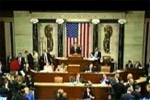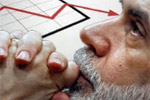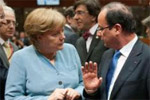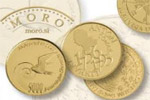Economy |
|
Ekonomija |
An interview with Paul Krugman

|
|
Intervju s Paulom Krugmanom

|
The leading spokesman for the liberal cause

|
|
Predstavnik liberalnih načela

|
Was Japan a cautionary tale?

|
|
Je li Japan bio poučna priča?

|
Fiscal policy

|
|
Fiskalna politika

|
Krugman's view of US politics

|
|
Krugmanov stav o američkoj politici

|
How does Krugman cope with the hatred?

|
|
Kako se Krugman nosi s mržnjom?

|
The eurozone crisis

|
|
Kriza u eurozoni

|
Should people invest their savings in gold?

|
|
Bi li ljudi trebali uložiti svoju ušteđevinu u zlato?

|
|
|
|
|

An interview with Paul Krugman
Paul Krugman is the 2008 Nobel laureate in economics, Princeton professor of economics and international affairs, and liberal columnist of the New York Times.
I have agreed to meet for lunch with him.
The restaurant is impersonal and beginning to empty (it's a late lunch, at two o'clock).
Paul Krugman, 59, most hated and most admired columnist in the US, is sitting at a small table in the middle of the restaurant, working on his laptop.
It is Thursday and he is writing his column.
What, I ask, is it on?
"It's going to be Europe", he replies...
 Search for more... Search for more...
Paul Krugman is the 2008 Nobel laureate in economics, Princeton professor of economics and international affairs, and liberal columnist of the New York Times.
I have agreed to meet for lunch with him.
The restaurant is impersonal and beginning to empty (it's a late lunch, at two o'clock).
Paul Krugman, 59, most hated and most admired columnist in the US, is sitting at a small table in the middle of the restaurant, working on his laptop.
It is Thursday and he is writing his column.
What, I ask, is it on?
"It's going to be Europe", he replies.
"Partly because it is coming to a head, partly because I am a little overstretched and that's what I'm ready for. So I'm going to do that one".
I understand the feeling of being overstretched: Krugman is writing two columns a week, posting regularly on his blog, writing popular books and teaching.
So, I ask, will the argument of the column be that "it's all over for the eurozone"?
"No. I don't think they can save Greece but they can still save the rest if they're willing to offer open-ended financing and macroeconomic expansion. But this would mean persuading the Germans to change their philosophy of economic life. The prospect of hanging concentrates the mind; the prospect of a collapse of the euro might concentrate their minds".
» Search for more...
|
|

Intervju s Paulom Krugmanom
Paul Krugman je dobitnik Nobelove nagrade za ekonomiju 2008. godine, profesor ekonomije i međunarodnih odnosa na Princetonu i liberalni kolumnist New York Timesa.
Dogovorio sam ručak s njim.
Restoran je bezličan i počinje se prazniti (ručamo kasno, dva su sata).
Paul Krugman, 59-godišnjak, najomraženiji i najviše obožavani kolumnist u SAD-u, sjedi za malim stolom u sredini restorana i radi na prijenosnom računalu.
Četvrtak je i on piše svoju kolumnu.
Pitam ga o čemu je.
"Pišem o Europi", odgovara on...
 Potraži više... Potraži više...
Paul Krugman je dobitnik Nobelove nagrade za ekonomiju 2008. godine, profesor ekonomije i međunarodnih odnosa na Princetonu i liberalni kolumnist New York Timesa.
Dogovorio sam ručak s njim.
Restoran je bezličan i počinje se prazniti (ručamo kasno, dva su sata).
Paul Krugman, 59-godišnjak, najomraženiji i najviše obožavani kolumnist u SAD-u, sjedi za malim stolom u sredini restorana i radi na prijenosnom računalu.
Četvrtak je i on piše svoju kolumnu.
Pitam ga o čemu je.
"Pišem o Europi", odgovara on.
"Djelomice zato što stvari kulminiraju, djelomice zato što sam malo prezaposlen i na to sam spreman. Zato ću o tome pisati".
Razumijem osjećaj prezaposlenosti: Krugman piše dvije kolumne tjedno, redovito piše na svojem blogu, piše popularne knjige i poučava.
Dakle, pitam, hoće li tema kolumne biti "svršeno je s eurozonom"?
"Ne. Mislim da ne mogu spasiti Grčku, ali još uvijek mogu spasiti ostatak ako budu spremni ponuditi neograničeno financiranje i makroekonomsko širenje. Ali to bi značilo da Nijemce treba uvjeriti da promijene svoju filozofiju o gospodarskom životu. Omča oko vrata usredotočuje misli; mogućnost propasti eura mogla bi usredotočiti njihove misli".
» Potraži više...
|

The leading spokesman for the liberal cause
I change the subject to ask how he has coped with the shift from being predominantly an academic economist to being the leading spokesman for the liberal cause.
How did this happen?
"Well, it was funny", he responds.
"I was doing a column for Slate and then a bit for Fortune, towards the end, and then the New York Times came along with this offer.
It was 1999.
We thought I'd be writing about the follies of dotcoms and stuff like that and then it turns out that it's a much more awesome and ominous responsibility.
It was nothing I ever planned"...
 Search for more... Search for more...
|
|

Predstavnik liberalnih načela
Mijenjam temu upitavši kako se nosi s prelaskom iz uloge prvenstveno akademskog ekonomista u ulogu predstavnika liberalnih načela.
Kako je došlo do toga?
"Pa, bilo je to smiješno", odgovara on.
"Pisao sam kolumnu za Slate a zatim neko vrijeme za Fortune, pred kraj, a zatim je New York Times istupio s ovom ponudom.
To je bilo 1999. godine.
Mislili smo da ću pisati o ludostima internetskih kompanija i sličnim stvarima, ali tada je ispalo da se radi o mnogo većoj i zloslutnijoj odgovornosti.
Nikad to nisam planirao"...
 Potraži više... Potraži više...
|

Was Japan a cautionary tale?
He agrees.
"What we thought was that Japan was a cautionary tale.
It has turned into Japan as almost a role model.
They never had as big a slump as we have had.
They managed to have growing per capita income through most of what we call their 'lost decade'.
My running joke is that the group of us who were worried about Japan a dozen years ago ought to go to Tokyo and apologise to the emperor.
We've done worse than they ever did.
When people ask: might we become Japan?
I say: I wish we could become Japan".
I ask whether he is not being unfair to Ben Bernanke, chairman of the Federal Reserve and a former colleague at Princeton.
After all, Bernanke has avoided US deflation...
 Search for more... Search for more...
|
|

Je li Japan bio poučna priča?
On se slaže.
"Mislili smo da je Japan poučna priča.
Međutim, Japan se gotovo pretvorio u uzor.
Oni nikad nisu imali tako veliku krizu poput nas.
Imali su povećanje dohotka po stanovniku u većem dijelu onoga što mi nazivamo njihovim 'izgubljenim desetljećem'.
Ja se često šalim da bi nas nekoliko koji smo bili zabrinuti za Japan prije desetak godina trebalo otići u Tokio i ispričati se caru.
Nama je bilo gore nego njima.
Kada ljudi pitaju: možemo li mi postati Japan?
Ja kažem: kad bismo to barem mogli".
Pitam ga nije li to nepošteno prema Benu Bernankeu, predsjedniku Saveznih rezervi i bivšem kolegi s Princetona.
Ipak je Bernanke izbjegao deflaciju u Americi...
 Potraži više... Potraži više...
|

Fiscal policy
"Fiscal policy might be great.
But if you're not getting it you should be doing something on the Fed side and I think that logic becomes stronger and stronger as the years go by.
And it's sad to see that the Fed has largely washed its hands of responsibility for getting us out of the slump.
I hope that some day Ben Bernanke and Janet Yellen will think that I've done them a favour.
There's all this sniping from the hard money guys and somebody needs to say no, if we actually think about this realistically, you're doing too little and not too much".
So what, I wonder, would he do if he were put in charge?
He says he would add maybe another $2 trillion to the Fed's balance sheet, by purchasing a wider range of assets, including more private sector liabilities.
"But mostly", he continues, "you work on the expectations side.
I think mostly what you really need to do is to signal that you're going to keep your foot on the gas pedal".
It does not even matter, he believes, if people are not sure the Fed will carry through.
They just have to believe it might happen.
"So if Ben Bernanke made a statement, or the board made a statement, saying that we are reconsidering our views about the inflation target, even if we don't have a credible commitment that they're going to deliver 3.7 per cent annual inflation over five years, that's still a help"...
 Search for more... Search for more...
|
|

Fiskalna politika
"Fiskalna politika može biti izvrsna.
Ali ako nema zamaha, trebali biste učiniti nešto na strani Feda i ja mislim da logika s godinama sve više jača.
Tužno je vidjeti da je Fed velikim dijelom sa sebe skinuo odgovornost da nas izvuče iz krize.
Nadam se da će Ben Bernanke i Janet Yellen jednog dana smatrati da sam im učinio uslugu.
Frajeri čvrste valute napadaju i netko mora reći ne, ako o tome zaista razmislimo realistično, radite premalo, a ne previše".
Pitam se što bi učinio kad bi on bio glavni?
Kaže da bi možda stavio dva dodatna bilijuna američkih dolara na račun Feda, kupujući veći raspon imovine, uključujući više obveza privatnog sektora.
"Ali uglavnom", nastavlja, "radite na strani očekivanja.
Mislim da prije svega stvarno trebate pokazati da ćete držati stopalo na papučici gasa".
On vjeruje da nije važno ni ako ljudi nisu sigurni hoće li Fed izdržati.
Samo moraju vjerovati da bi se to moglo dogoditi.
"Prema tome, ako su Ben Bernanke ili odbor izjavili da preispitujemo svoja stajališta u vezi s ciljem inflacije, čak i ako nemamo pouzdani dokaz da će rezultirati godišnjom inflacijom od 3,7 posto u petogodišnjem razdoblju, to ipak pomaže"...
 Potraži više... Potraži više...
|

Krugman's view of US politics
We turn to his view of US politics.
How does he explain what is going on?
He responds that a couple of things do seem to operate here.
One is money.
There are think-tanks which don't actually do a whole lot of thinking but which are lavishly financed.
You can have a lot of fun if you go back and look at what they were saying, and it's hilarious, about Iceland as a role model, or the wonders of the Irish system.
"And then there is something about the appeal of this hard-money, gold-standard thing and it's always had an appeal, but it seems even stronger now.
I would have thought that the fact that people like me have been so much closer to being right on inflation and interest rates would move a substantial number of people into thinking that maybe their preconceptions were not right.
But no".
I ask whether he is disheartened by the failure of people on his side of the political argument to stand up for what they believe in...
 Search for more... Search for more...
|
|

Krugmanov stav o američkoj politici
Okrećemo se njegovom stavu o američkoj politici.
Kako objašnjava ono što se događa?
On odgovara da se čini kako se ovdje radi o nekoliko stvari.
Jedna je novac.
Postoje trustovi mozgova koji zapravo ne naprežu jako svoj mozak, ali koji su dobro financirani.
Možete se jako zabaviti ako se prisjetite što su govorili, to je urnebesno, govorili su o Islandu kao uzoru ili čudima irskog sustava.
"No ima nešto u privlačnosti ove čvrste valute, zlatnog standarda, koji je uvijek bio privlačan, ali sad se čini čak snažnijim.
Pomislio bih da će činjenica da su ljudi poput mene bili mnogo bliže tome da budu u pravu što se tiče inflacije i kamatnih stopa potaknuti mnoge ljude da pomisle kako njihovi unaprijed stvoreni zaključci možda nisu bili točni.
Ali ne".
Upitam ga obeshrabruje li ga neuspjeh ljudi koji se slažu s njegovim političkim argumentima da se zauzmu za ono u što vjeruju...
 Potraži više... Potraži više...
|

How does Krugman cope with the hatred?
So how does Krugman cope with the hatred he attracts?
"Years 2002 to 2004 were by far the worst, and that was mostly not about economics, that was about the fact that I was pretty much alone in saying we'd been lied into going to war.
But you do need to develop a thick skin.
I've partly developed the attitude that if I don't get a whole lot of hysterical pushback then I probably have wasted the space in the column".
"I've been in this a long time and it was really shocking in the beginning.
But eventually you get acclimated.
I think it scares a lot of people off.
I think a lot of journalists, the first time they publish something even mildly critical of rightwing orthodoxy, they hit this firestorm and they never come back.
They run scared ever after.
But I'm long past that point".
I ask him about his punchy and provocative style.
How conscious is it?..
 Search for more... Search for more...
|
|

Kako se Krugman nosi s mržnjom?
Dakle, kako se Krugman nosi s mržnjom koju privlači?
"Razdoblje od 2002. godine do 2004. godine bilo je nadaleko najlošije, i tu se uglavnom nije radilo o ekonomiji, nego o činjenici da sam manje-više bio sam kad sam govorio da nam se lagalo kako bi nas se uvuklo u rat.
Ali trebate imati debelu kožu.
Donekle sam razvio stav da sam vjerojatno potratio prostor u kolumni ako mi nisu upućeni mnogi histerični napadi".
"U ovome sam dugo vremena i u početku je bilo stvarno šokantno.
Ali s vremenom se naviknete.
Mislim da to mnoge preplaši.
Mislim da se mnogi novinari, kada prvi put objave nešto što, pa makar i blago, kritizira desničarsku ortodoksiju, suoče s ovom vatrenom olujom i nikad se ne vrate.
Otada bježe u strahu.
Ali ja sam to odavno prošao".
Upitao sam ga o njegovom snažnom i provokativnom stilu.
Koliko je on njega svjestan?..
 Potraži više... Potraži više...
|

The eurozone crisis
So how's his new book doing?
"It's good.
It's funny.
We're on the bestseller list in the US.
But it's selling like hotcakes in Europe.
We're in fourth printing in Spain and they're about to put ads on the sides of Madrid buses, apparently".
This brings us back to the eurozone crisis.
I remark that the Germans are now in a position of having to choose between permanently bailing out those they regard as deadbeats or breaking it up, causing an immense economic and political mess.
I feel quite sorry for them...
 Search for more... Search for more...
|
|

Kriza u eurozoni
Kako se prodaje njegova nova knjiga?
"Dobra je.
Smiješna je.
Nalazimo se na popisu bestselera u SAD-u.
Ali u Europi ide kao halva.
U Španjolskoj iz tiska izlazi četvrto izdanje i čini se da će staviti reklame na madridske autobuse".
Time se vraćamo na krizu eurozone.
Napominjem da su Nijemci sada u položaju u kojem moraju birati između trajnog saniranja onih koje smatraju neplatišama ili prestajanja s time, što će dovesti do goleme ekonomske i političke zbrke.
Jako mi ih je žao...
 Potraži više... Potraži više...
|

Should people invest their savings in gold?
If a few years back, you invested your savings in gold, then by now you will have made quite a profit.
The price of gold has gone up 137.24% in the last five years (as priced in US dollars), and silver has gone up even more, by 174%.
The most important cities for gold trading remain London, Zurich and Tokyo.
The largest gold mines in the world are in North America, Australia, South Africa and Russia.
The size of national gold reserves around the world has not changed much in the last few years, particularly not in the countries which hold the largest shares.
This is partly to do with the Washington treaty between many central banks, which states that countries cannot sell more then 500 tons of gold per year from their reserves and no more then 2,500 tons in five years.
"We now see some Asian countries transferring their gold from Swiss banks to banks back home", said Irena Moro, owner of Moro & Kunst, the only company in Slovenia that trades gold and other precious metals.
The company’s web site, "www.moro.si", displays prices which are updated several times a day.
They trade in US dollars converted into Euros...
 Search for more... Search for more...
|
|

Bi li ljudi trebali uložiti svoju ušteđevinu u zlato?
Ako ste prije nekoliko godina uložili svoju ušteđevinu u zlato, onda ste do danas ostvarili popriličan profit.
Cijena zlata je porasla za 137.24 posto u posljednjih pet godina (izraženo u američkim dolarima), a srebro je poskupilo još i više, za 174 posto.
Najvažniji gradovi za trgovinu zlatom i dalje su London, Zurich i Tokio.
Najveći rudnici zlata na svijetu nalaze se u Sjevernoj Americi, Australiji, Južnoj Africi i Rusiji.
Količina državnih zlatnih rezervi u svijetu nije se mnogo promijenila u posljednjih nekoliko godina, posebno ne u zemljama koje drže najveće udjele.
To je djelomično povezano s Washingtonskim ugovorom između mnogih središnjih banaka, u kojem se navodi da zemlje ne mogu prodati više od 500 tona zlata godišnje iz svojih rezervi i ne više od 2.500 tona u razdoblju od pet godina.
"Sada svjedočimo činjenici da neke azijske zemlje prebacuju svoje zlato iz švicarskih banaka u svoje matične banke", kaže Irena Moro, vlasnica tvrtke Moro & Kunst, jedine tvrtke u Sloveniji koja trguje zlatom i drugim plemenitim metalima.
Na internetskoj stranici ove tvrtke, "www.moro.si", navedene su cijene koje tvrtka ažurira više puta dnevno.
Tvrtka posluje u američkim dolarima pretvorenima u eure...
 Potraži više... Potraži više...
|
|
|




